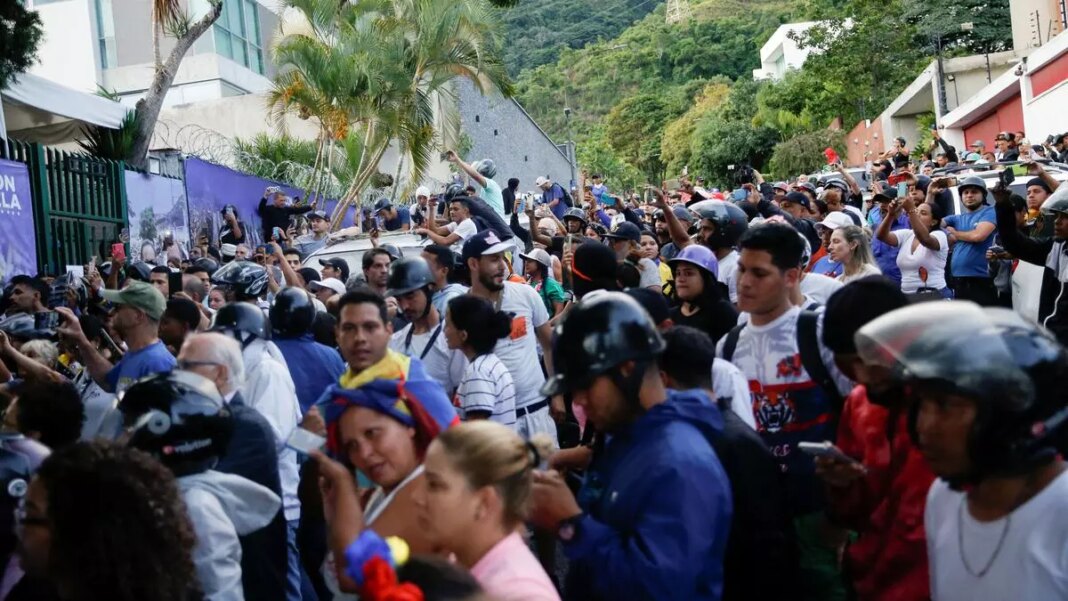Hundreds of Venezuelans have taken to the streets to protest what they say is a fraudulent win by President Nicolás Maduro, the long-time socialist leader who presided over the country’s economic collapse.
The capital of Caracas was eerily quiet most of the morning, but protests have begun to intensify. Hundreds marched toward downtown from Petare, one of the city’s largest low-income neighbourhoods. Some were on motorcycles, others were on foot. Some appeared to be armed with guns. Around 4:30 p.m., hundreds had reached Caracas’ international airport, screaming “freedom.”
The demonstrations followed a presser Monday morning in which the regime claimed opposition leader María Corina Machado was involved in a plot to alter voting results sent from polling places to electoral authority headquarters. Shortly after, Maduro was certified as Venezuela’s president elect. The moves escalated tensions in an already contentious vote that was the biggest threat yet to Maduro’s rule.
The outcry doesn’t come as a surprise. Machado and her stand-in candidate, Edmundo González created an energetic citizen movement premised on overhauling the economy and reuniting families separated by the diaspora of 7.7 million Venezuelans during Maduro’s term. An early July survey by Caracas-based firm Delphos found that almost 40 per cent of Venezuelans believed that if there was fraud, they should protest until the government recognizes the real results of the election.
Even if only a few protesters go out, it could resemble the massive demonstrations against Maduro’s idol and mentor, the late Hugo Chávez — who unseated the political establishment — in his early years of government, Delphos director Félix Seijas said in mid-July. It would also mark the third wave of protests against Maduro since he first rose to power in 2013. His administration brutally repressed demonstrators in the two previous outbreaks, killing, injuring or imprisoning dozens of people.
The opposition party has said that González is the rightful winner of the election. An exit poll conducted by US firm Edison Research had González winning by more than 30 percentage points — a stark contrast to the National Electoral Council’s tally, which said Maduro clinched 51.2 per cent of the votes compared to 44.2 per cent for González.
In a presser in the early Monday morning hours, Machado had asked witnesses and table staffers not to move from polling stations, and requested that more Venezuelans join them there.
“No one is calling for people to protest, to engage in violence,” González said. “We’re making a call for reconciliation, for peace.”
Meanwhile, international pressure has been ramping up on Maduro to provide transparency over the election tally. Brazil, Chile, Colombia and Peru have demanded to see proof of his victory, while Panama went as far as announcing a temporary suspension of ties with the Caracas regime.
Biden administration officials said Monday that the US would determine future sanctions on the country based off whether the government released voting data.
It’s in Maduro’s interest to legitimize his vote not only to Venezuelans but to the world. Without recognition of his presidency, much-needed sanctions relief is unlikely, meaning Venezuela is staring down a a difficult road to economic recovery.
Unrest could also halt the newly signed projects by the state-oil company and ramped up oil production from international oil majors, including US driller Chevron, which account for more than 95 per cent of Venezuela’s foreign revenue.
Another exodus is expected, too. In May, a survey found that should Maduro secure a third term, 41 per cent of the country’s estimated 28.8 million remaining citizens will consider leaving.
More stories like this are available on bloomberg.com


